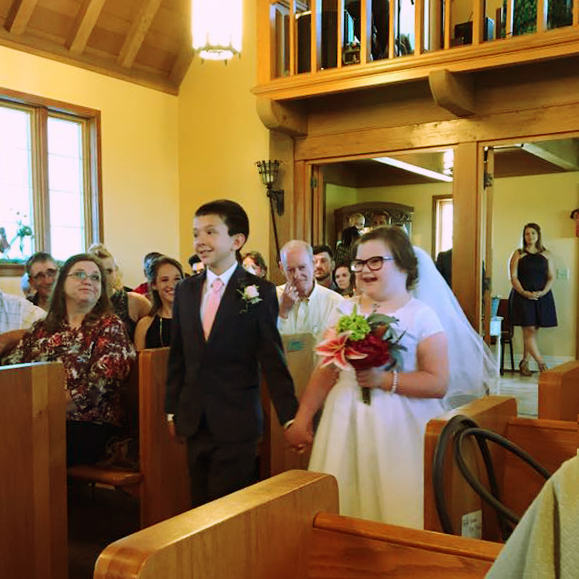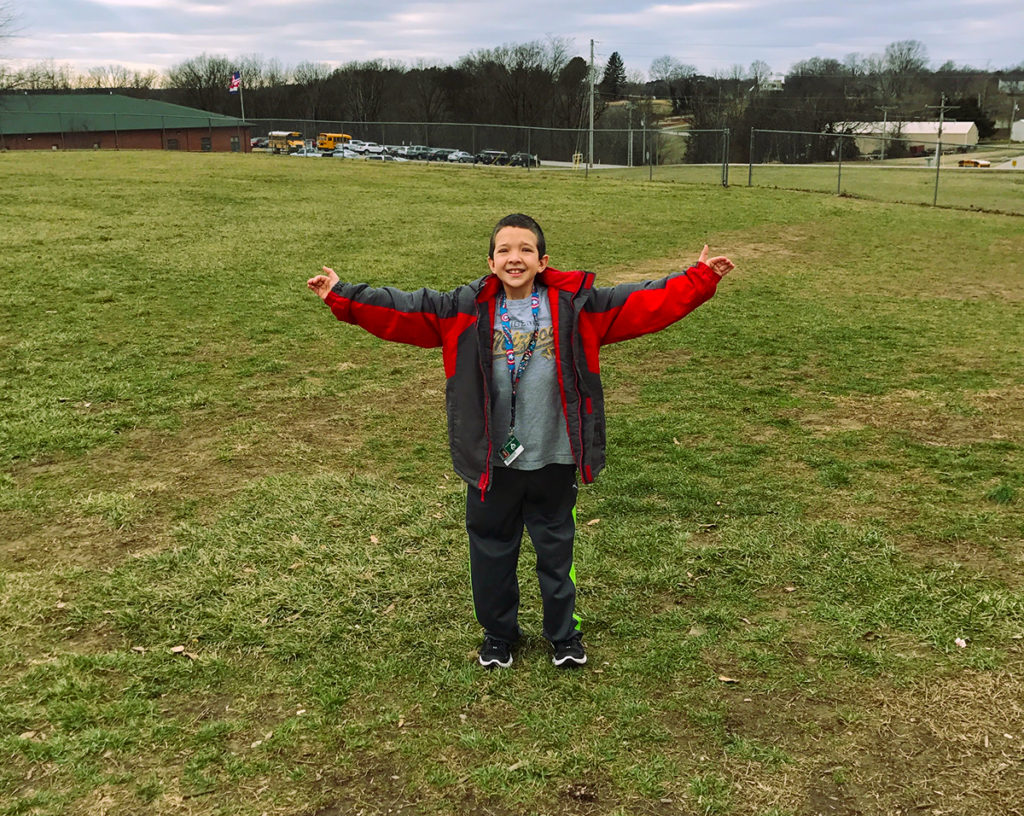More Related Posts
What Can Be, What Should Be, What Needs to Be: Potential is Defined by Opportunity

August 2017
Ogden, Utah
Twelve-month-old Arielle is challenging other children to raise the bar and get to work.
Today’s children are doing fewer chores than ever before, and as a result we should not be shocked to realize that many teens and young adults have missed some very important lessons.
Having specific jobs that the child owns is a fundamental building block to learning how to be responsible.
Learning to do things that don’t appear to directly help you is vitally important. Those children who learn to contribute and help others or the family are generally not going to be those who grow up feeling entitled. Doing things for the family helps connect the child to the family and helps provide some needed perspective. Self-centered children can lead to self-absorbed teens and adults.
The more children learn how to take care of themselves, their homes, and their families, the more independent they feel and become. Children who learn independence develop confidence and initiate doing more and more themselves, while those who are dependent fear and often fail to move themselves forward.
Learning how to take care of your living space, your room, and your home not only teaches independence, but also teaches an appreciation for clean, organized, and pleasant surroundings. Learning how to do your laundry, prepare your own nutritious food, take care of the yard, and even learning how to fix and repair things around the house all lead to confident, highly capable adults. These apparently simple skills help develop the perception and the capability that permits you to take on challenges, confront problems, and address them.
Many teens and adults sadly never develop a strong work ethic. A good work ethic is exemplified by the basics, including reliability, dedication, productivity, cooperation, and strength of character.
I hear many parents today say that their children do not have time for chores, their day is full of schoolwork, sports, music, dance lessons, etc. If your children don’t have time for chores and all of the vital lessons that come with it, I suggest you reevaluate what they are gaining from the sports and the “lessons” and think about the real basic lessons they are missing
A few years back I had the opportunity to participate in a meeting with five couples. These five couples were part of an organization of young presidents of companies. They invited me to the meeting because they were having a discussion about how they were “screwing up their children.” The couples had children ranging in age from about 10 into their 20s. As I began the discussion, we started talking about the lives of these company presidents. We all quickly learned that four of the five men had grown up in pretty typical middle class families and had chores from early ages and had jobs through high school and college. In addition, the four went to state colleges and excelled in life because of hard work, a good understanding of who they were, and a strong work ethic. All of the couples realized that their present standard of living had not helped, but had hindered their children’s development. The families were able to afford to hire help to clean their houses, take care of the lawn, and even help with food preparation. The couples had mistakenly thought that freeing their children from chores and giving them more time for sports and various lessons was providing them with an advantage. What was learned through the discussion was that the families were universally disappointed in their children’s basic characters, sense of responsibility, and their lack of a strong work ethic. They had been at a loss to understand how their children, having been given “every advantage,” were not developing into the adults they had hoped and worked for.
The meeting with these couples was very enlightening. You don’t need to be the president of a company and wealthy to make the same mistakes as these couples. As I was leaving the meeting that night, I made a discovery. Four of the five men were presidents of companies and one was not. In fact, despite having graduated from Harvard, the fifth was unemployed. His wife was the president of a company.
Here are a few helpful guidelines to help you get your children heading down the road to more chores and a better character.
Many parents neglect to realize that one of our jobs as parents is to raise our children to be functional adults, responsible, competent members of society, and perhaps parents themselves, who will need all the tools they can get to help the next generation succeed. There are far too many big children out there who believe they are adults.
—Bob Doman
P.S. In the spirit of full disclosure, Arielle, the Big Helper, is my granddaughter, daughter of my son, Laird, and his lovely wife, Sadie. I have issued the challenge in her name. The videos were shot the week of her first birthday. She is a beautiful and, of course, smart little girl whose proud grandfather is going to have to exercise a great deal of self-restraint not to spoil.
Don’t know how I could have missed it, but last Saturday August 26th was evidently National Dog Day! So, in a belated tribute to all of our dogs, here are my two—Lucy Liu and Boudreaux. A couple of miniature wirehaired dachshunds. I think these dogs understand a couple of hundred words and pay better attention to me than most children—or adults for that matter.
Over the years, I have encouraged many families to get dogs for their children, particularly children without a close sibling or playmate. Children with developmental and communication issues who find it difficult or even impossible to verbally communicate or play with others often find the companionship of a dog to be a wonderful addition to their lives.
As a child who was never permitted to have a dog (I ended up with a duck) I am happy to champion the cause of all of those children out there who want and need a dog.

This picture is from the recent wedding of Natalie Hagan, a great gal who has helped implement NACD programs with these two terrific kids—Abby and Lucas. Between these two proactive families, their schools, and caring individuals like Natalie and Debbie Hayden, the OT that referred them and has helped them implement their programs, we have a great model of what can be, what should be, and what needs to be.
Potential needs to be defined by opportunity and not by diagnosis or label. Outcomes for children with the same or similar labels can be dramatically different, with those outcomes largely being predicated on the opportunities provided.
Abby and Lucas both have wonderful families—families who have been great at getting their NACD programs implemented, advocating for their children, and looking toward their children’s futures. In both cases, the kids’ schools have learned to cooperate with and support the parents in the implementation of their NACD programs and their goals, and in addition have provided appropriate class placement and support. Both families have also successfully found help at home to assist in completing the children’s individualized NACD programs with excellent results.
I spoke of Lucas in a previous post, so now let’s talk about Abby.
Abby was referred to NACD by her occupational therapist when she was just over a year old. Abby is now an eight-year-old who will be entering the 3rd grade in a typical classroom and who is doing well academically and socially. She is involved in Girl Scouts, ballet, and she plays softball. Abby is a star, loved by classmates and everyone who is fortunate enough to know her. She is an entrepreneur. She also has Trisomy 21 (Down syndrome).
Being proactive and planning for her future, her parents have already started a business for her called, “Abby’s Mini Golden Doodles” with her own facebook page:
Abby is actively helping with the first litter of puppies and is learning how to care for the dogs. The plan is for her to learn dog training and handling, with the goal of developing a business involving dog breeding and dog handling, as well as a companion and therapy dog program.

One of the very difficult realities that most adults with Down syndrome and many adults with other developmental issues have is that the world is often only welcoming up to a certain point. Through the years, we have seen young adults with good academic function, good social skills, and even college degrees that could not get a job even close to commensurate with their abilities and skills. Imagine a child with Down syndrome working hard, with a ton of support from their family, academically competing with their peers, getting the same high school diploma as their classmates, having in many cases more appropriate social skills than most of their peers, and then being encouraged to pack groceries or move grocery carts upon graduation by their vocational advisors. This is obviously something that must change, but until it does, families having or starting businesses for their children is a very viable alternative for proactive families.
Abby is a delightful, happy, wonderful, contributing and beautiful child with a bright future. When everyone works together–parents, caregivers, therapists, school administrators, teachers, community members and organizations–to help the family achieve their goals for their child, there should be no limits.
P.S. – Often at the conclusion of Abby’s visits with me, she stops at the door, turns around, gives me a huge Abby smile, waves, and says, “Bye, Bobby.” Gotta love this kid!
by Bob Doman

I needed to write this story about my nine-year-old hero, Lucas Fritsche. Lucas exemplifies what can be, what should be, and what needs to be. Lucas’s story is one of a committed and proactive family, therapists who knew this child needed more than what they could provide, a school that learned to work with and assist a family, and a community that was willing to help and to listen.
I first met Lucas and his family in 2014. Lucas came with a bit of a “rep.” In preschool he was notorious for biting someone daily. When he started with NACD, he was in first grade and had been globally regressing since the previous summer. At the age of six, he had already been diagnosed with PDD/NOS, epilepsy, complex partial seizures (for which he was being medicated), sensory dysfunction, low muscle tone, and digestive and sleep issues. His school had him classified as autistic. He also had severe behavior, social, and academic issues.
From a neurodevelopmental perspective, Lucas had some sensory issues, as well as issues with muscle tone, strength, coordination, developmental motor skills, physiology, and auditory and visual processing. In addition to all of that, he had a questionable seizure disorder. The bottom line was we had a six-and-a-half-year-old child who was neurodevelopmentally where I would have liked to have seen him at age three, going on four. He had lots of potential—nothing scary, just pieces to put together.
Lucas had been referred to us by friends who have a child with Down syndrome named Abby, who was then and still is on an NACD program. I will a write separate post about Abby and her super occupational therapist, Debbie Hayden, shortly.
Lucas’s terrific parents were obviously anxious to see their son do better—much better—and were doing all they knew how to do with the help of doctors, therapists, and the school. They needed more and needed to address the causes, not the symptoms. Under ideal situations, I would have pulled Lucas out of school, kept him home, and had the majority of the day to address his issues one on one. Lucas’s dad was a farmer, a job requiring more than full time attention; his mom worked full time in HR; and they also had Lucas’s three-year-old sister, who needed their attention as well. So, Lucas needed to be at school full-time, and we needed to elicit the help of the school, as well as find some people to help his parents with program after school.
After that initial evaluation, I discussed his issues with his parents, and we started on a plan to address his problems, including his behavioral issues. The reality of Lucas’s behavior was that we had a strong willed, rather intense, six-and-a-half-year-old in first grade who had the ability to understand, think, and communicate like a three- going on four-year-old and a neurodevelopmental problem—we had to address his particular pieces.
It would have been nice to wave a magic wand, if it were possible, and have advanced him three years in a blink. Unfortunately, it takes some time to normalize sensory dysfunction, address physiological issues, sleep, severe processing delay, catch up academically and create new patterns of behavior.
Second grade had its challenges. He entered a new school year, and on day four he bolted from a situation. When his teacher grabbed him, he punched her. Unfortunately, because of a recent surgery, she needed to go to the hospital. Lucas was suspended for three days. Not a great start. After he was allowed back to school, he got upset at lunch with another student and hit him. Following this incident, we set up a behavior strategy to coordinate things between his parents and the school, which ended the aggression. That year he spent 85% of his school day in a resource room with an aide who did his NACD program with him. The other 15% of his day, he was with his peers.
It was then decided that it would be in Lucas’s best interest to repeat second grade while we continued the catch-up path. This second time around, with coordination between parents, the school, and NACD, Lucas spent his day in the regular class with a part-time aide, with some pullout time for school-based therapies. Through that year, the time with the aide continued to diminish, and with his advancing processing skills and the opportunity to be with peers, his social interaction and social skills developed. A year following his suspension, Lucas received the school’s “Pirate to Be Proud Of” award, an award given to just one child per grade in the school each quarter. Academically, he went from failing to As and Bs. By January of that year all outside therapies were discontinued—they were no longer needed.
Third grade started well; however, a significant event occurred in September. During recess Lucas felt he was falsely blamed for an issue that had occurred. When the class returned to their classroom, there was no Lucas. Lucas, having in his first years of school been sent to the principal’s office on numerous occasions for inappropriate behavior, had not gone back to class, but had instead gone to the principal’s office. He didn’t go because he had done something wrong, but because he needed to report the misunderstanding of the situation, and he felt that because he was blamed, he needed to report there. Having gained audience with the principal, Lucas stated his case and then proceeded to inform the principal that the playground was too small, that his friend who was in a wheelchair could not access the playground, and announced that he wished to speak to the school board about the issue. At that point, I knew I was working with a really special young man.
In February Lucas finally got to address 50-60 community members, parents, teachers, and administrators and presented a plan to make the playground handicap accessible. (See the video below.)
Lucas’s mom is currently working with a local group to create an inclusive playground in the community; and Lucas, because of his initiative with the school, has been invited to participate and has become a key spokesman in the development of this 1.5-million-dollar project.
Lucas is now an A/B student and is doing great socially. This past June, he won a purple ribbon for his 4H woodworking project, which moves him to the state competition; and this September, he will be showing a steer at the local community fair.
Lucas has shed all his previous labels; his seizures are history as well as his medications, his therapists, and his aides; and he has gained a new image: bright, kind, compassionate, witty, smart, and my hero.
Lucas represents what can be, what should be, and what needs be. We need to look at children as individuals with unlimited potential and not as labels. He exemplifies how we can get everyone working together to help achieve the parents’ vision for their child and produce the desired results.
P.S. – Lucas read an email I had sent to his parents where I told them that their boy was going to do great things. Lucas’s response was, “If Mr. Bob says I will do great things, then I will.” I’d put money on it.